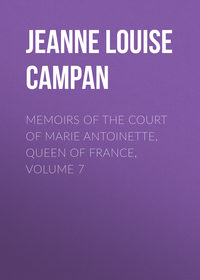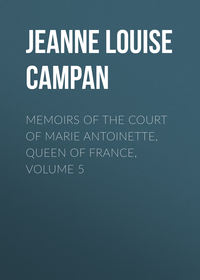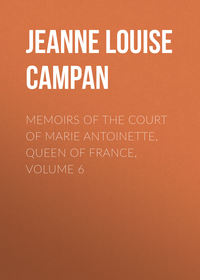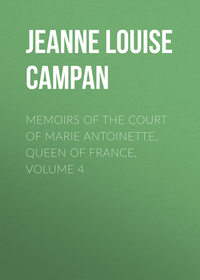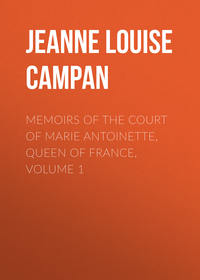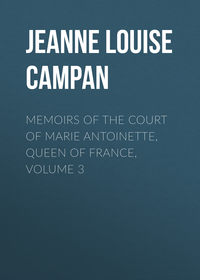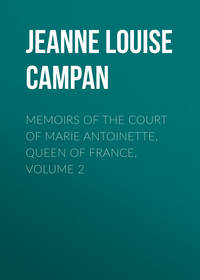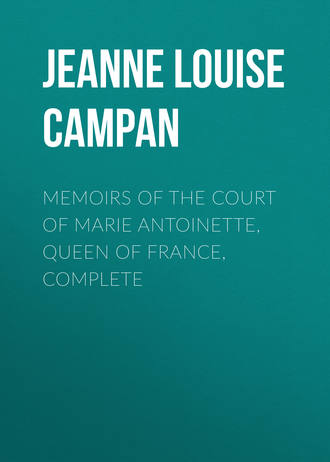 полная версия
полная версияMemoirs of the Court of Marie Antoinette, Queen of France, Complete
[The King, having purchased the Chateau of Rambouillet from the Duc de Penthievre, amused himself with embellishing it. I have seen a register entirely in his own handwriting, which proves that he possessed a great variety of information on the minutiae of various branches of knowledge. In his accounts he would not omit an outlay of a franc. His figures and letters, when he wished to write legibly, were small and very neat, but in general he wrote very ill. He was so sparing of paper that he divided a sheet into eight, six, or four pieces, according to the length of what he had to write. Towards the close of the page he compressed the letters, and avoided interlineations. The last words were close to the edge of the paper; he seemed to regret being obliged to begin another page. He was methodical and analytical; he divided what he wrote into chapters and sections. He had extracted from the works of Nicole and Fenelon, his favourite authors, three or four hundred concise and sententious phrases; these he had classed according to subject, and formed a work of them in the style of Montesquieu. To this treatise he had given the following general title: “Of Moderate Monarchy” (De la Monarchie temperee), with chapters entitled, “Of the Person of the Prince;” “Of the Authority of Bodies in the State;” “Of the Character of the Executive Functions of the Monarchy.” Had he been able to carry into effect all the grand precepts he had observed in Fenelon, Louis XVI. would have been an accomplished monarch, and France a powerful kingdom. The King used to accept the speeches his ministers presented to him to deliver on important occasions; but he corrected and modified them; struck out some parts, and added others; and sometimes consulted the Queen on the subject. The phrase of the minister erased by the King was frequently unsuitable, and dictated by the minister’s private feelings; but the King’s was always the natural expression. He himself composed, three times or oftener, his famous answers to the Parliament which he banished. But in his letters he was negligent, and always incorrect. Simplicity was the characteristic of the King’s style; the figurative style of M. Necker did not please him; the sarcasms of Maurepas were disagreeable to him. Unfortunate Prince! he would predict, in his observations, that if such a calamity should happen, the monarchy would be ruined; and the next day he would consent in Council to the very measure which he had condemned the day before, and which brought him nearer the brink of the precipice.—SOULAVIE, “Historical and Political Memoirs of the Reign of Louis XVI.,” vol. ii.]
This Prince combined with his attainments the attributes of a good husband, a tender father, and an indulgent master.
Unfortunately he showed too much predilection for the mechanical arts; masonry and lock-making so delighted him that he admitted into his private apartment a common locksmith, with whom he made keys and locks; and his hands, blackened by that sort of work, were often, in my presence, the subject of remonstrances and even sharp reproaches from the Queen, who would have chosen other amusements for her husband.
[Louis XVI. saw that the art of lock-making was capable of application to a higher study, He was an excellent geographer. The most valuable and complete instrument for the study of that science was begun by his orders and under his direction. It was an immense globe of copper, which was long preserved, though unfinished, in the Mazarine library. Louis XVI. invented and had executed under his own eyes the ingenious mechanism required for this globe.—NOTE BY THE EDITOR.]
Austere and rigid with regard to himself alone, the King observed the laws of the Church with scrupulous exactness. He fasted and abstained throughout the whole of Lent. He thought it right that the queen should not observe these customs with the same strictness. Though sincerely pious, the spirit of the age had disposed his mind to toleration. Turgot, Malesherbes, and Necker judged that this Prince, modest and simple in his habits, would willingly sacrifice the royal prerogative to the solid greatness of his people. His heart, in truth, disposed him towards reforms; but his prejudices and fears, and the clamours of pious and privileged persons, intimidated him, and made him abandon plans which his love for the people had suggested.
[During his stay at Avignon, Monsieur, afterwards Louis XVIII, lodged with the Duc de Crillon; he refused the town-guard which was offered him, saying, “A son of France, under the roof of a Crillon, needs no guard.”—NOTE BY THE EDITOR.]
Monsieur had more dignity of demeanour than the King; but his corpulence rendered his gait inelegant. He was fond of pageantry and magnificence. He cultivated the belles lettres, and under assumed names often contributed verses to the Mercury and other papers.
His wonderful memory was the handmaid of his wit, furnishing him with the happiest quotations. He knew by heart a varied repertoire, from the finest passages of the Latin classics to the Latin of all the prayers, from the works of Racine to the vaudeville of “Rose et Colas.”
The Comte d’Artoisi had an agreeable countenance, was well made, skilful in bodily exercises, lively, impetuous, fond of pleasure, and very particular in his dress. Some happy observations made by him were repeated with approval, and gave a favourable idea of his heart. The Parisians liked the open and frank character of this Prince, which they considered national, and showed real affection for him.
The dominion that the Queen gained over the King’s mind, the charms of a society in which Monsieur displayed his wit, and to which the Comte d’Artois—[Afterwards Charles X.]—gave life by the vivacity of youth, gradually softened that ruggedness of manner in Louis XVI. which a better-conducted education might have prevented. Still, this defect often showed itself, and, in spite of his extreme simplicity, the King inspired those who had occasion to speak to him with diffidence. Courtiers, submissive in the presence of their sovereign, are only the more ready to caricature him; with little good breeding, they called those answers they so much dreaded, Les coups de boutoir du Roi.—[The literal meaning of the phrase “coup de boutoir,” is a thrust from the snout of a boar.]
Methodical in all his habits, the King always went to bed at eleven precisely. One evening the Queen was going with her usual circle to a party, either at the Duc de Duras’s or the Princesse de Glumenee’s. The hand of the clock was slily put forward to hasten the King’s departure by a few minutes; he thought bed-time was come, retired, and found none of his attendants ready to wait on him. This joke became known in all the drawing-rooms of Versailles, and was disapproved of there. Kings have no privacy. Queens have no boudoirs. If those who are in immediate attendance upon sovereigns be not themselves disposed to transmit their private habits to posterity, the meanest valet will relate what he has seen or heard; his gossip circulates rapidly, and forms public opinion, which at length ascribes to the most august persons characters which, however untrue they may be, are almost always indelible.
NOTE. The only passion ever shown by Louis XVI. was for hunting. He was so much occupied by it that when I went up into his private closets at Versailles, after the 10th of August, I saw upon the staircase six frames, in which were seen statements of all his hunts, when Dauphin and when King. In them was detailed the number, kind, and quality of the game he had killed at each hunting party during every month, every season, and every year of his reign.
The interior of his private apartments was thus arranged: a salon, ornamented with gilded mouldings, displayed the engravings which had been dedicated to him, drawings of the canals he had dug, with the model of that of Burgundy, and the plan of the cones and works of Cherbourg. The upper hall contained his collection of geographical charts, spheres, globes, and also his geographical cabinet. There were to be seen drawings of maps which he had begun, and some that he had finished. He had a clever method of washing them in. His geographical memory was prodigious. Over the hall was the turning and joining room, furnished with ingenious instruments for working in wood. He inherited some from Louis XV., and he often busied himself, with Duret’s assistance, in keeping them clean and bright. Above was the library of books published during his reign. The prayer books and manuscript books of Anne of Brittany, Francois I, the later Valois, Louis XIV., Louis XV., and the Dauphin formed the great hereditary library of the Chateau. Louis XVI. placed separately, in two apartments communicating with each other, the works of his own time, including a complete collection of Didot’s editions, in vellum, every volume enclosed in a morocco case. There were several English works, among the rest the debates of the British Parliament, in a great number of volumes in folio (this is the Moniteur of England, a complete collection of which is so valuable and so scarce). By the side of this collection was to be seen a manuscript history of all the schemes for a descent upon that island, particularly that of Comte de Broglie. One of the presses of this cabinet was full of cardboard boxes, containing papers relative to the House of Austria, inscribed in the King’s own hand: “Secret papers of my family respecting the House of Austria; papers of my family respecting the Houses of Stuart and Hanover.” In an adjoining press were kept papers relative to Russia. Satirical works against Catherine II. and against Paul I. were sold in France under the name of histories; Louis XVIII. collected and sealed up with his small seal the scandalous anecdotes against Catherine II., as well as the works of Rhulieres, of which he had a copy, to be certain that the secret life of that Princess, which attracted the curiosity of her contemporaries, should not be made public by his means.
Above the King’s private library were a forge, two anvils, and a vast number of iron tools; various common locks, well made and perfect; some secret locks, and locks ornamented with gilt copper. It was there that the infamous Gamin, who afterwards accused the King of having tried to poison him, and was rewarded for his calumny with a pension of twelve thousand livres, taught him the art of lock-making. This Gamin, who became our guide, by order of the department and municipality of Versailles, did not, however, denounce the King on the 20th December, 1792. He had been made the confidant of that Prince in an immense number of important commissions; the King had sent him the “Red Book,” from Paris, in a parcel; and the part which was concealed during the Constituent Assembly still remained so in 1793. Gamin hid it in a part of the Chateau inaccessible to everybody, and took it from under the shelves of a secret press before our eyes. This is a convincing proof that Louis XVI. hoped to return to his Chiteau. When teaching Louis XVI. his trade Gamin took upon himself the tone and authority of a master. “The King was good, forbearing, timid, inquisitive, and addicted to sleep,” said Gamin to me; “he was fond to excess of lock-making, and he concealed himself from the Queen and the Court to file and forge with me. In order to convey his anvil and my own backwards and forwards we were obliged to use a thousand stratagems, the history of which would: never end.” Above the King’s and Gamin’s forges and anvils was an, observatory, erected upon a platform covered with lead. There, seated on an armchair, and assisted by a telescope, the King observed all that was passing in the courtyards of Versailles, the avenue of Paris, and the neighbouring gardens. He had taken a liking to Duret, one of the indoor servants of the palace, who sharpened his tools, cleaned his anvils, pasted his maps, and adjusted eyeglasses to the King’s sight, who was short-sighted. This good Duret, and indeed all the indoor servants, spoke of their master with regret and affection, and with tears in their eyes.
The King was born weak and delicate; but from the age of twenty-four he possessed a robust constitution, inherited from his mother, who was of the House of Saxe, celebrated for generations for its robustness. There were two men in Louis XVI., the man of knowledge and the man of will. The King knew the history of his own family and of the first houses of France perfectly. He composed the instructions for M. de la Peyrouse’s voyage round the world, which the minister thought were drawn up by several members of the Academy of Sciences. His memory retained an infinite number of names and situations. He remembered quantities and numbers wonderfully. One day an account was presented to him in which the minister had ranked among the expenses an item inserted in the account of the preceding year. “There is a double charge,” said the King; “bring me last year’s account, and I will show it yet there.” When the King was perfectly master of the details of any matter, and saw injustice, he was obdurate even to harshness. Then he would be obeyed instantly, in order to be sure that he was obeyed.
But in important affairs of state the man of will was not to be found. Louis XVI. was upon the throne exactly what those weak temperaments whom nature has rendered incapable of an opinion are in society. In his pusillanimity, he gave his confidence to a minister; and although amidst various counsels he often knew which was the best, he never had the resolution to say, “I prefer the opinion of such a one.” Herein originated the misfortunes of the State.—SOULAVIE’S “Historical and Political Memoirs Of the Reign Of LOUIS XVI.,” VOL ii.
CHAPTER VII
The winter following the confinement of the Comtesse d’Artois was very severe; the recollections of the pleasure which sleighing-parties had given the Queen in her childhood made her wish to introduce similar ones in France. This amusement had already been known in that Court, as was proved by sleighs being found in the stables which had been used by the Dauphin, the father of Louis XVI. Some were constructed for the Queen in a more modern style. The Princes also ordered several; and in a few days there was a tolerable number of these vehicles. They were driven by the princes and noblemen of the Court. The noise of the bells and balls with which the harness of the horses was furnished, the elegance and whiteness of their plumes, the varied forms of the carriages, the gold with which they were all ornamented, rendered these parties delightful to the eye. The winter was very favourable to them, the snow remaining on the ground nearly six weeks; the drives in the park afforded a pleasure shared by the spectators.
[Louis XVI., touched with the wretched condition of the poor of Versailles during the winter of 1776, had several cart-loads of wood distributed among them. Seeing one day a file of those vehicles passing by, while several noblemen were preparing to be drawn swiftly over the ice, he uttered these memorable words: “Gentlemen, here are my sleighs!”—NOTE BY THE EDITOR.]
No one imagined that any blame could attach to so innocent an amusement. But the party were tempted to extend their drives as far as the Champs Elysees; a few sleighs even crossed the boulevards; the ladies being masked, the Queen’s enemies took the opportunity of saying that she had traversed the streets of Paris in a sleigh.
This became a matter of moment. The public discovered in it a predilection for the habits of Vienna; but all that Marie Antoinette did was criticised.
Sleigh-driving, savouring of the Northern Courts, had no favour among the Parisians. The Queen was informed of this; and although all the sleighs were preserved, and several subsequent winters lent themselves to the amusement, she would not resume it.
It was at the time of the sleighing-parties that the Queen became intimately acquainted with the Princesse de Lamballe, who made her appearance in them wrapped in fur, with all the brilliancy and freshness of the age of twenty,—the emblem of spring, peeping from under sable and ermine. Her situation, moreover, rendered her peculiarly interesting; married, when she was scarcely past childhood, to a young prince, who ruined himself by the contagious example of the Duc d’Orleans, she had had nothing to do from the time of her arrival in France but to weep. A widow at eighteen, and childless, she lived with the Duc de Penthievre as an adopted daughter. She had the tenderest respect and attachment for that venerable Prince; but the Queen, though doing justice to his virtues, saw that the Duc de Penthievre’s way of life, whether at Paris or at his country-seat, could neither afford his young daughter-in-law the amusements suited to her time of life, nor ensure her in the future an establishment such as she was deprived of by her widowhood. She determined, therefore, to establish her at Versailles; and for her sake revived the office of superintendent, which had been discontinued at Court since the death of Mademoiselle de Clermont. It is said that Maria Leczinska had decided that this place should continue vacant, the superintendent having so extensive a power in the houses of queens as to be frequently a restraint upon their inclinations. Differences which soon took place between Marie Antoinette and the Princesse de Lamballe respecting the official prerogatives of the latter, proved that the wife of Louis XV. had acted judiciously in abolishing the office; but a kind of treaty made between the Queen and the Princess smoothed all difficulties. The blame for too strong an assertion of claims fell upon a secretary of the superintendent, who had been her adviser; and everything was so arranged that a firm friendship existed between these two Princesses down to the disastrous period which terminated their career.
Notwithstanding the enthusiasm which the splendour, grace, and kindness of the Queen generally inspired, secret intrigues continued in operation against her. A short time after the ascension of Louis XVI. to the throne, the minister of the King’s household was informed that a most offensive libel against the Queen was about to appear. The lieutenant of police deputed a man named Goupil, a police inspector, to trace this libel; he came soon after to say that he had found out the place where the work was being printed, and that it was at a country house near Yverdun. He had already got possession of two sheets, which contained the most atrocious calumnies, conveyed with a degree of art which might make them very dangerous to the Queen’s reputation. Goupil said that he could obtain the rest, but that he should want a considerable sum for that purpose. Three thousand Louis were given him, and very soon afterwards he brought the whole manuscript and all that had been printed to the lieutenant of police. He received a thousand louis more as a reward for his address and zeal; and a much more important office was about to be given him, when another spy, envious of Goupil’s good fortune, gave information that Goupil himself was the author of the libel; that, ten years before, he had been put into the Bicetre for swindling; and that Madame Goupil had been only three years out of the Salpetriere, where she had been placed under another name. This Madame Goupil was very pretty and very intriguing; she had found means to form an intimacy with Cardinal de Rohan, whom she led, it is said, to hope for a reconciliation with the Queen. All this affair was hushed up; but it shows that it was the Queen’s fate to be incessantly attacked by the meanest and most odious machinations.
Another woman, named Cahouette de Millers, whose husband held an office in the Treasury, being very irregular in conduct, and of a scheming turn of mind, had a mania for appearing in the eyes of her friends at Paris as a person in favour at Court, to which she was not entitled by either birth or office. During the latter years of the life of Louis XV. she had made many dupes, and picked up considerable sums by passing herself off as the King’s mistress. The fear of irritating Madame du Barry was, according to her, the only thing which prevented her enjoying that title openly. She came regularly to Versailles, kept herself concealed in a furnished lodging, and her dupes imagined she was secretly summoned to Court.
This woman formed the scheme of getting admission, if possible, to the presence of the Queen, or at least causing it to be believed that she had done so. She adopted as her lover Gabriel de Saint Charles, intendant of her Majesty’s finances,—an office, the privileges of which were confined to the right of entering the Queen’s apartment on Sunday. Madame de Villers came every Saturday to Versailles with M. de Saint Charles, and lodged in his apartment. M. Campan was there several times. She painted tolerably well, and she requested him to do her the favour to present to the Queen a portrait of her Majesty which she had just copied. M. Campan knew the woman’s character, and refused her. A few days after, he saw on her Majesty’s couch the portrait which he had declined to present to her; the Queen thought it badly painted, and gave orders that it should be carried back to the Princesse de Lamballe, who had sent it to her. The ill success of the portrait did not deter the manoeuvrer from following up her designs; she easily procured through M. de Saint Charles patents and orders signed by the Queen; she then set about imitating her writing, and composed a great number of notes and letters, as if written by her Majesty, in the tenderest and most familiar style. For many months she showed them as great secrets to several of her particular friends. Afterwards, she made the Queen appear to write to her, to procure various fancy articles. Under the pretext of wishing to execute her Majesty’s commissions accurately, she gave these letters to the tradesmen to read, and succeeded in having it said, in many houses, that the Queen had a particular regard for her. She then enlarged her scheme, and represented the Queen as desiring to borrow 200,000 francs which she had need of, but which she did not wish to ask of the King from his private funds. This letter, being shown to M. Beranger, ‘fermier general’ of the finances, took effect; he thought himself fortunate in being able to render this assistance to his sovereign, and lost no time in sending the 200,000 francs to Madame de Villers. This first step was followed by some doubts, which he communicated to people better informed than himself of what was passing at Court; they added to his uneasiness; he then went to M. de Sartine, who unravelled the whole plot. The woman was sent to St. Pelagie; and the unfortunate husband was ruined, by replacing the sum borrowed, and by paying for the jewels fraudulently purchased in the Queen’s name. The forged letters were sent to her Majesty; I compared them in her presence with her own handwriting, and the only distinguishable difference was a little more regularity in the letters.
This trick, discovered and punished with prudence and without passion, produced no more sensation out of doors than that of the Inspector Goupil.
A year after the nomination of Madame de Lamballe to the post of superintendent of the Queen’s household, balls and quadrilles gave rise to the intimacy of her Majesty with the Comtesse Jules de Polignac. This lady really interested Marie Antoinette. She was not rich, and generally lived upon her estate at Claye. The Queen was astonished at not having seen her at Court earlier. The confession that her want of fortune had even prevented her appearance at the celebration of the marriages of the Princes added to the interest which she had inspired.
The Queen was full of consideration, and took delight in counteracting the injustice of fortune. The Countess was induced to come to Court by her husband’s sister, Madame Diane de Polignac, who had been appointed lady of honour to the Comtesse d’Artois. The Comtesse Jules was really fond of a tranquil life; the impression she made at Court affected her but little; she felt only the attachment manifested for her by the Queen. I had occasion to see her from the commencement of her favour at Court; she often passed whole hours with me, while waiting for the Queen. She conversed with me freely and ingenuously about the honour, and at the same time the danger, she saw in the kindness of which she was the object. The Queen sought for the sweets of friendship; but can this gratification, so rare in any rank, exist between a Queen and a subject, when they are surrounded, moreover, by snares laid by the artifice of courtiers? This pardonable error was fatal to the happiness of Marie Antoinette.


